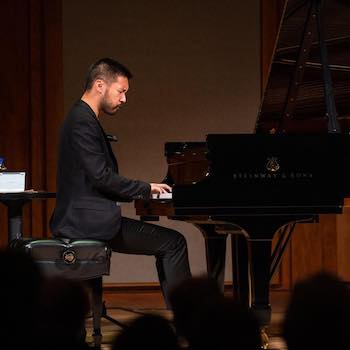Classical Concert Review: Pianist Conrad Tao in Recital
By Jonathan Blumhofer
During the pandemic months, Conrad Tao — who, in addition to being an exceptional pianist, is also an accomplished composer — has evidently been honing his skills as an improviser.

Conrad Tao in action at the keyboard. Photo: Facebook
Often enough there’s an unspoken rule that accompanies Beethoven’s late work: since the music draws so deeply on the well of lived experience, only performers long in years might adequately plumb its depths. Among other things, the 27-year-old pianist Conrad Tao blew up that canard at the end of his local recital debut (presented by the Celebrity Series of Boston) on Wednesday night at Longy’s Pickman Hall.
Playing Beethoven’s Piano Sonata no. 31 in A-flat, op. 110, Tao offered a performance that was at once eminently logical yet profoundly expressive. In the first movement, his playing — dreamy and almost improvisatory in tone — belied an exceptional understanding of the space, direction, sonority, and wonder that is at the heart of this music.
So, too the brief Scherzo, with its blistering central part.
In the finale, Tao teased out the gently pulsing figures of the nervously searching introduction and got the pair of winsome “sad songs” (so marked by the composer) to soar. But it was the fugues, flawlessly weighted and voiced, surging with unalloyed majesty and power, that crowned this reading. Indeed, the second one, which starts at a whisper and builds to a roar, was imbued with a special feeling of catharsis and release.
All that came before in the night — pieces by John Adams, Jason Eckhardt, J.S. Bach, Robert Schumann, and Tao himself — seemed to lead inexorably to this towering Beethoven.
During the pandemic months, Tao — who, in addition to being an exceptional pianist, is also an accomplished composer — has evidently been honing his skills as an improviser. The night featured a pair of the latter, the first introducing John Adams’s China Gates, the second serving as a bridge between Bach’s Wenn wir in höchsten Nöten sein and Schumann’s Kinderszenen.
Prior to the earlier one, Tao dropped a collection of magnets under the piano’s lid. They added a funky, Cowell-esque buzz to his improvisation, which was often angular with hints of jazz, but drew out beguiling Gamelan-like qualities in Adams’s short 1977 essay.
After collecting the magnets, Tao proceeded to Eckhardt’s “Antennaria plantaginifolia” (“Pussytoes”). Written for the pianist, the piece came across as a flurrying web of gossamer piano textures and silences, all discreetly dispatched.
Effortless embellishments in the Bach chorale prelude set up Tao’s second improvisation of the night, this one periodically bluesy in mood but melodically directed and well shaped.
A keen ear for the melodic line and a strong sense of character marked Tao’s account of Schumann’s Kinderszenen.
Phrasings were flexible in “Bittendes Kind”; “Wichtige Begebenheit” snapped; and the spastic contrasts of “Fürchtenmachen” were all smartly etched. Throughout his performance, heart and technique went hand-in-hand, nowhere more so than in Tao’s lustrous take on “Träumerei.”
Between the Schumann and Beethoven selections came the New England premiere of Tao’s Keyed In. A 12-minute-long Celebrity Series co-commission, it’s a piece that explores the line between the overtone series and the tempered limits of the piano keyboard.
In practice, this meant that about two-thirds of Keyed In involved lots of dense, loud, low textures out of which a haze of overtones gradually emerged. Over its concluding part — spare, lyrical, in a higher tessitura — a halo of further overtones, prepared by the first section’s deluge, appear like an apparition.
It’s a fascinating effort and Tao played it commandingly. But, bracing though the concept may be, it’s an old one: Beethoven explored the same device (though in a very different context) in the finale of op. 110, a connection Tao effectively underlined in his reading.
So, at the end of the day, everything was connected — or so it seemed — including Tao’s affecting encore of Fred Hersch’s lovely Pastorale (Homage to Robert Schumann).
Performed, as the pianist noted, in honor of World AIDS Day, Pastorale served as a marker of that event as well as a tribute to the enduring qualities of the human spirit. In this, the piece followed in the footsteps of the night’s Bach and Beethoven selections; but, honestly, one can make too much of these coincidences. Suffice it to say, this was just some beautiful music gorgeously played.
Jonathan Blumhofer is a composer and violist who has been active in the greater Boston area since 2004. His music has received numerous awards and been performed by various ensembles, including the American Composers Orchestra, Kiev Philharmonic, Camerata Chicago, Xanthos Ensemble, and Juventas New Music Group. Since receiving his doctorate from Boston University in 2010, Jon has taught at Clark University, Worcester Polytechnic Institute, and online for the University of Phoenix, in addition to writing music criticism for the Worcester Telegram & Gazette.
